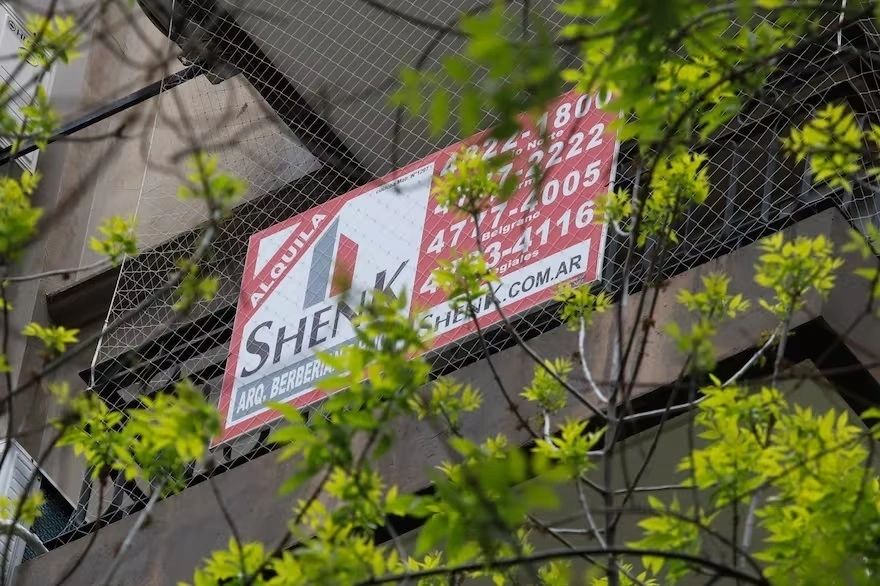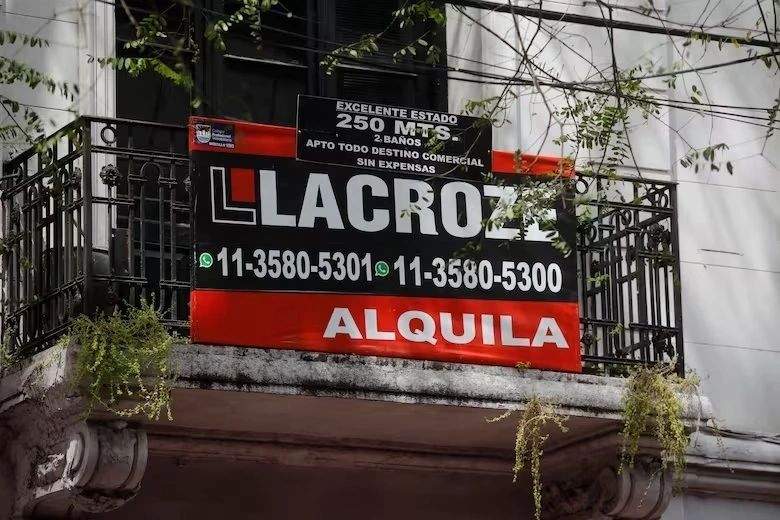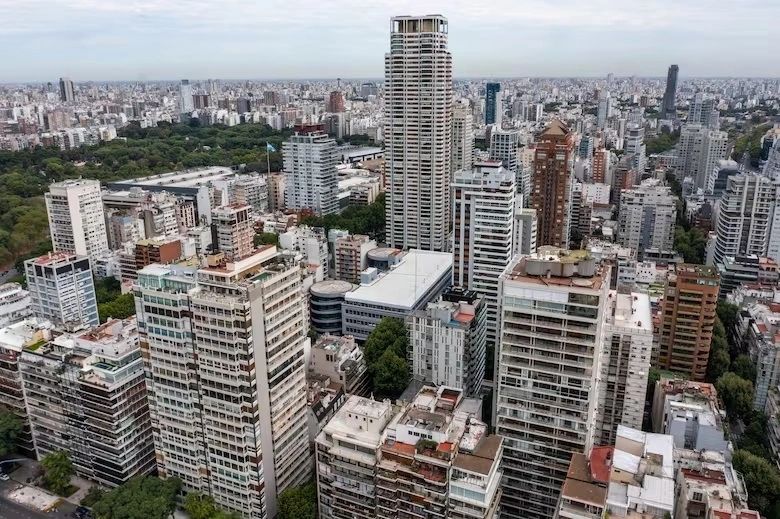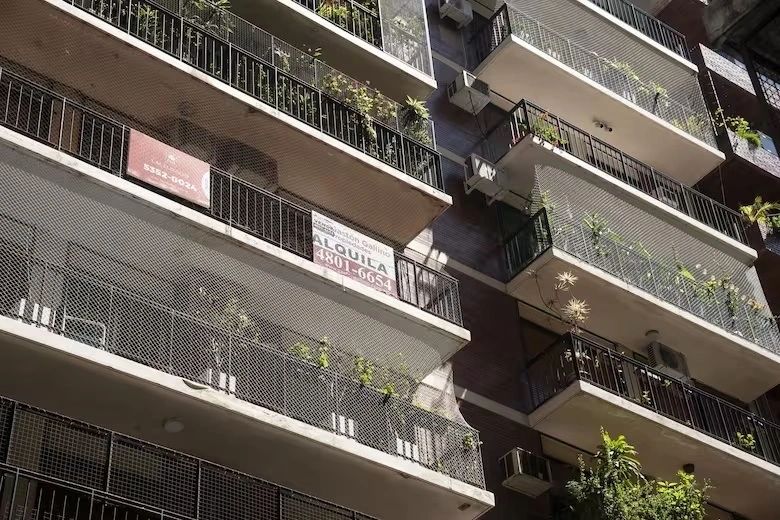BuySellBA
Administrator
The reasons why the rent can increase up to 5 times at a stretch - La Nación Propiedades

Source:

 www.lanacion.com.ar
www.lanacion.com.ar
November 06, 2023
By Mercedes Soriano
The contracts that were signed in 2020 and have now come to an end are published on the market for five times the value they charged until recently; the reasons

The contracts that were signed in 2020 and have now come to an end could increase up to five times the value they paid until recently
“They didn't renew my contract,” “Everything is overpriced and I can't find anything,” and “I don't know where I'm going to live now” are phrases that resonate more than ever in Argentina. The rental market is going through one of its worst crises with a supply that tends to zero and increases that pierce the clouds. After the sanction of the modification of the law that sought to revive it, the state of alarm did not cease and the market discovered that it had a deeper bottom to which it could fall.
The rental contracts that were signed in the first months of Law 27, 551 of July 2020 and that come to an end today come to market with a value approximately five times higher than the price that tenants had been paying.
“A tenant who rented a three-bedroom apartment with a garage on Olleros and paid $120,000 per month, when the contract ends the owner is going to ask him for $650,000 for the same apartment . The same thing happens with an apartment of the same size in a tower in Belgrano, which until the end of the contract paid $200,000 per month and now that same home went on the market for $800,000,” Verónica Balayan, owner of Maure Inmobiliaria, exemplifies with two real cases.
That is to say, if a tenant's contract is about to end and they want to stay in the same apartment for a renovation, the owner may ask for five times what they are currently paying. The desperation of those left without a place to live is such that many resort to creative ways and spread jingles on their social networks to, with a touch of humor, spread their search.
The contracts signed under the law sanctioned in the pandemic were updated only once a year based on the Rental Contract Index (ICL), which runs behind inflation and whose calculation is two months behind at the time of making the adjustment. During these three years, the voice of the owners echoed in the market and claimed that rents are the only service that increases once a year.

The high prices at which an apartment that is currently ending a traditional contract is offered are due to inflation, shortages and a regulatory framework that disadvantaged the market.
This scenario is closely linked to the inflationary panorama. Considering that year-on-year inflation in September reached 138.3%, for the owners it represented a significant loss of profitability and it was no longer a business.
It is for this reason that many owners who offer their home for traditional rental try to anticipate the inflation that will occur during the year and that the price will remain frozen. The annual update, then, raises the entry barrier and makes access to housing more difficult.
For this reason, the market price at which the few traditional rentals are offered grows month by month above the general increase in prices. According to a report from Mercado Libre, the price asked by the owners of a unit in the Buenos Aires Metropolitan Area to start a contract increased more than 20% in October.
The feeling of the tenants is that today the real estate companies take advantage of the chaos to charge ridiculous figures, but the reality is that not only inflation and outdated prices come into play but also the law of supply and demand. As there are so few units offered for rent with traditional contracts, an oversupply of temporary rentals that undersupply the traditional market and simultaneously a very high demand from people looking for a home, prices react to the shortage and skyrocket, explains Balayan.
The scourge of shortage intensified when the modification of the rental law came into effect on October 17. “As the rule prohibits offering and making rentals in dollars, last week there was an exodus of publications on real estate portals ,” says the specialist, a fact that makes sense when one considers that between 60% and 70% of the published offer in Zonaprop it was in dollars . A week after the sanction of the new rule, the rental offer on the portal of the Unique College of Real Estate Brokers of the Autonomous City of Buenos Aires (CUCICBA) fell 44%. The same trend was replicated on other portals:

According to a report from Mercado Libre, the price asked by the owners of a unit in the Buenos Aires Metropolitan Area to start a contract increased more than 20% in October
In her experience, Verónica Balayan validates this shortage: “In the good times back in 2008, approximately 15 rental properties entered the real estate agency per month, of which you closed 10, however this month only one entered.”
It also goes back to his beginnings in the profession and compares the hyperinflation scenario of 1989 with the present. “ During Alfonsín's hyperinflation there were increases of 200% per month, the contracts were updated monthly due to inflation and the market did not shrink like it does now . At most, the tenant expressed that he could not pay it and reached an intermediate agreement with the owner,” he says. He believes that the regulatory framework that he began to govern in 2020 and continues today under another label is partially responsible because it determines the periodicity of the adjustments, requires compliance with a certain national index and extends the contracts for an extra year.
Enrique Abatti, president of the Chamber of Property Owners of the Argentine Republic, explains that at that time “law 23091 allowed monthly adjustments and said update had to be indexed exclusively to official indexes published by the statistics and census institutes of the Nation and the provinces, like INDEC.” The last modification of the law last October requires the contract to be indexed to the Casa Propia coefficient, which, like the ICL, lags behind the advance of inflation.

Currently, real estate agencies are gradually receiving homes for long-term rental under the terms of the current law.
At the end of the contracts, tenants can spend months looking for an apartment to live in. The desperation of not finding a viable option can be alleviated with a free and legal tool that allows you to extend the contract for a few months.
For landlords, it is a tool that allows them to update the rental value for periods shorter than those dictated by law while keeping a good tenant and not playing the lottery by taking on another person who may not pay on time or damages the property during your stay.
“In this inflationary context, it is advisable to make extensions for three months that accompany the advance of inflation , ” says Enrique Abatti, adding that if the tenant does not validate that price, he leaves and due to the low supply it is likely that another one will appear immediately.
At the same time, it clarifies that "during the extension, staggered increases cannot be made, so if it is extended for one year you will have the contract fixed for that period", so it is recommended to do it for short periods to periodically update the rental value. In other words, tenant and owner can make an extension every month, quarter, year or period that they deem appropriate so as not to lose against inflation or have the property retained for a long time. It should be noted that lately six-month extensions were made but given the rapid devaluation, owners choose to do so for shorter periods.
Outside the law, there are cases in which the contract is extended - for example - by one year, but the parties agree to adjust the rental price every certain number of months depending on the progress of inflation.
ww.buysellba.com

Source:
Inquilinos que renuevan: los motivos por los que el alquiler puede aumentar hasta 5 veces de un tirón
Los contratos que se firmaron en 2020 y ahora llegaron a su fin se publican en el mercado por el quíntuple del valor que cobraban hasta hace poco; las razones
November 06, 2023
Tenants renewing: The reasons why the rent can increase up to 5 times at a stretch
By Mercedes Soriano
The contracts that were signed in 2020 and have now come to an end are published on the market for five times the value they charged until recently; the reasons

The contracts that were signed in 2020 and have now come to an end could increase up to five times the value they paid until recently
“They didn't renew my contract,” “Everything is overpriced and I can't find anything,” and “I don't know where I'm going to live now” are phrases that resonate more than ever in Argentina. The rental market is going through one of its worst crises with a supply that tends to zero and increases that pierce the clouds. After the sanction of the modification of the law that sought to revive it, the state of alarm did not cease and the market discovered that it had a deeper bottom to which it could fall.
The rental contracts that were signed in the first months of Law 27, 551 of July 2020 and that come to an end today come to market with a value approximately five times higher than the price that tenants had been paying.
“A tenant who rented a three-bedroom apartment with a garage on Olleros and paid $120,000 per month, when the contract ends the owner is going to ask him for $650,000 for the same apartment . The same thing happens with an apartment of the same size in a tower in Belgrano, which until the end of the contract paid $200,000 per month and now that same home went on the market for $800,000,” Verónica Balayan, owner of Maure Inmobiliaria, exemplifies with two real cases.
That is to say, if a tenant's contract is about to end and they want to stay in the same apartment for a renovation, the owner may ask for five times what they are currently paying. The desperation of those left without a place to live is such that many resort to creative ways and spread jingles on their social networks to, with a touch of humor, spread their search.
The reasons for the jump
Why is the jump so big? For the specialist, it comes down to three factors: inflation, shortages and a regulatory framework that disadvantaged the market.The contracts signed under the law sanctioned in the pandemic were updated only once a year based on the Rental Contract Index (ICL), which runs behind inflation and whose calculation is two months behind at the time of making the adjustment. During these three years, the voice of the owners echoed in the market and claimed that rents are the only service that increases once a year.

The high prices at which an apartment that is currently ending a traditional contract is offered are due to inflation, shortages and a regulatory framework that disadvantaged the market.
This scenario is closely linked to the inflationary panorama. Considering that year-on-year inflation in September reached 138.3%, for the owners it represented a significant loss of profitability and it was no longer a business.
It is for this reason that many owners who offer their home for traditional rental try to anticipate the inflation that will occur during the year and that the price will remain frozen. The annual update, then, raises the entry barrier and makes access to housing more difficult.
For this reason, the market price at which the few traditional rentals are offered grows month by month above the general increase in prices. According to a report from Mercado Libre, the price asked by the owners of a unit in the Buenos Aires Metropolitan Area to start a contract increased more than 20% in October.
The feeling of the tenants is that today the real estate companies take advantage of the chaos to charge ridiculous figures, but the reality is that not only inflation and outdated prices come into play but also the law of supply and demand. As there are so few units offered for rent with traditional contracts, an oversupply of temporary rentals that undersupply the traditional market and simultaneously a very high demand from people looking for a home, prices react to the shortage and skyrocket, explains Balayan.
The scourge of shortage intensified when the modification of the rental law came into effect on October 17. “As the rule prohibits offering and making rentals in dollars, last week there was an exodus of publications on real estate portals ,” says the specialist, a fact that makes sense when one considers that between 60% and 70% of the published offer in Zonaprop it was in dollars . A week after the sanction of the new rule, the rental offer on the portal of the Unique College of Real Estate Brokers of the Autonomous City of Buenos Aires (CUCICBA) fell 44%. The same trend was replicated on other portals:
- Zonaprop -8%
- Argenprop -6%
- Free Market -13%
- Cabaprop -44%.

According to a report from Mercado Libre, the price asked by the owners of a unit in the Buenos Aires Metropolitan Area to start a contract increased more than 20% in October
In her experience, Verónica Balayan validates this shortage: “In the good times back in 2008, approximately 15 rental properties entered the real estate agency per month, of which you closed 10, however this month only one entered.”
It also goes back to his beginnings in the profession and compares the hyperinflation scenario of 1989 with the present. “ During Alfonsín's hyperinflation there were increases of 200% per month, the contracts were updated monthly due to inflation and the market did not shrink like it does now . At most, the tenant expressed that he could not pay it and reached an intermediate agreement with the owner,” he says. He believes that the regulatory framework that he began to govern in 2020 and continues today under another label is partially responsible because it determines the periodicity of the adjustments, requires compliance with a certain national index and extends the contracts for an extra year.
Enrique Abatti, president of the Chamber of Property Owners of the Argentine Republic, explains that at that time “law 23091 allowed monthly adjustments and said update had to be indexed exclusively to official indexes published by the statistics and census institutes of the Nation and the provinces, like INDEC.” The last modification of the law last October requires the contract to be indexed to the Casa Propia coefficient, which, like the ICL, lags behind the advance of inflation.

Currently, real estate agencies are gradually receiving homes for long-term rental under the terms of the current law.
The tool to avoid getting out of trouble
The fever to get an apartment is out of control and tenants validate the price they find in record time in order to secure a roof over their heads. “This month I published a 1-bedroom apartment in Las Cañitas for $300,000, I received 15 inquiries, made five visits on a rainy day and closed the rental contract, all in less than 10 hours,” says Verónica Balayan, owner of Maure Inmobiliaria.At the end of the contracts, tenants can spend months looking for an apartment to live in. The desperation of not finding a viable option can be alleviated with a free and legal tool that allows you to extend the contract for a few months.
For landlords, it is a tool that allows them to update the rental value for periods shorter than those dictated by law while keeping a good tenant and not playing the lottery by taking on another person who may not pay on time or damages the property during your stay.
“In this inflationary context, it is advisable to make extensions for three months that accompany the advance of inflation , ” says Enrique Abatti, adding that if the tenant does not validate that price, he leaves and due to the low supply it is likely that another one will appear immediately.
At the same time, it clarifies that "during the extension, staggered increases cannot be made, so if it is extended for one year you will have the contract fixed for that period", so it is recommended to do it for short periods to periodically update the rental value. In other words, tenant and owner can make an extension every month, quarter, year or period that they deem appropriate so as not to lose against inflation or have the property retained for a long time. It should be noted that lately six-month extensions were made but given the rapid devaluation, owners choose to do so for shorter periods.
Outside the law, there are cases in which the contract is extended - for example - by one year, but the parties agree to adjust the rental price every certain number of months depending on the progress of inflation.
ww.buysellba.com

